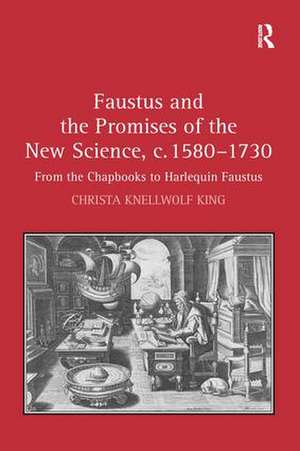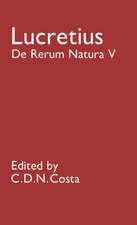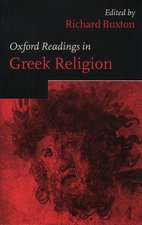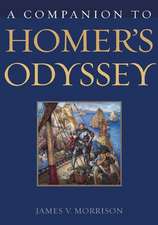Faustus and the Promises of the New Science, c. 1580-1730: From the Chapbooks to Harlequin Faustus
Autor Christa Kingen Limba Engleză Hardback – 28 noi 2008
Preț: 1057.09 lei
Preț vechi: 1289.13 lei
-18% Nou
Puncte Express: 1586
Preț estimativ în valută:
202.30€ • 210.42$ • 167.01£
202.30€ • 210.42$ • 167.01£
Carte tipărită la comandă
Livrare economică 15-29 aprilie
Preluare comenzi: 021 569.72.76
Specificații
ISBN-13: 9780754661337
ISBN-10: 0754661334
Pagini: 216
Ilustrații: includes 7 b&w illustrations
Dimensiuni: 156 x 234 x 14 mm
Greutate: 0.52 kg
Ediția:1
Editura: Taylor & Francis
Colecția Routledge
Locul publicării:Oxford, United Kingdom
ISBN-10: 0754661334
Pagini: 216
Ilustrații: includes 7 b&w illustrations
Dimensiuni: 156 x 234 x 14 mm
Greutate: 0.52 kg
Ediția:1
Editura: Taylor & Francis
Colecția Routledge
Locul publicării:Oxford, United Kingdom
Cuprins
Contents: Introduction: radical explorations of Faustus; The insatiable speculator: the hero of the Faust books; The devil of empiricism: Marlowe's Doctor Faustus; The alternative worlds of the new science: Burton, Milton and Fontenelle; Comedies, farces and Harlequin Doctor Faustus; Conclusion; Bibliography; Index.
Notă biografică
Christa Knellwolf King is a Visiting Professor of English and Cultural History at the University of Konstanz while retaining an adjunct position at the Australian National University.
Recenzii
’Faustus and the Promises of New Science is a resourceful book and an invigorating read, worth the attention of anyone interested in the connections between literary studies, the social perception of science, and cultural history.’ The British Society for Literature and Science
Descriere
Having identified the literary origins of the Faustus legend in the late sixteenth-century German Faust Book and its English translation, this book argues that the Faustus typology emerged as a vehicle for discussing morality and beliefs. This study examines a broad spectrum of transformations of the thematic core of the legend, concentrating on Marlowe's play, Milton's and Fontenelle's responses to seventeenth-century science, Mountfort's farcical Faustus play and early eighteenth-century harlequinades.
















